|
|
|
Sort Order |
|
|
|
Items / Page
|
|
|
|
|
|
|
| Srl | Item |
| 1 |
ID:
130445
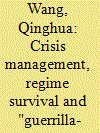

|
|
|
|
|
| Publication |
2014.
|
| Summary/Abstract |
Based on newly available memoirs and previously unexplored policy speeches by insiders, this article conducts a political analysis of the Chinese Communist Party's decision to radically expand college enrollment in June 1999. I argue that the decision exemplifies a "guerrilla-style approach" to policy-making. From late March to early June of 1999 when the radical expansion policy was formulated and legitimated, the top leadership ignored opposition from the Ministry of Education (MOE), overturned established policies and assumed de facto control over MOE bureaucratic power. This abrupt, forceful, disruptive and non-professional policy intervention, which aimed to ensure regime survival in the wake of the Asian financial crisis, was antithetical to regularized educational policy-making in post-Mao China.
|
|
|
|
|
|
|
|
|
|
|
|
|
|
|
|
| 2 |
ID:
149307
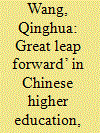

|
|
|
|
|
| Summary/Abstract |
This article begins with a clarification of the chronology of the ‘Great Leap Forward’ in Chinese higher education following the 1999 decision to expand. It then provides an in-depth examination of the leapfrogging story by focusing on why universities commonly adopted a development strategy that stressed it was better ‘to become larger and more comprehensive’. The author argues that this strategy and its associated ‘abnormal’ university behavior, particularly in cases where local universities ignored the Ministry of Education directives to slow down enrollment expansion in 2000–2005, were driven by two incentives: (1) to attain a higher bureaucratic rank or status; and (2) to obtain more government funds and more tuition. These two incentives were shaped by the bureaucratic control and management system, and the government funds allocation system respectively. The article concludes with a discussion of the larger implications of this study.
|
|
|
|
|
|
|
|
|
|
|
|
|
|
|
|
| 3 |
ID:
180453
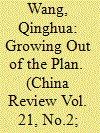

|
|
|
|
|
| Summary/Abstract |
This article examines market-oriented reforms in China’s graduate placement system (GPS) of higher education during 1978–1994 when China’s GPS was transformed from a state-controlled and centrally planned Soviet type to a rudimentary market model. Its goals are twofold. First, it advances the scholarship on GPS reform, a subject that is underresearched in studies of Chinese politics and of Chinese education. Second, it analyzes reform features by engaging the “gradualism” school on the political economy of China’s economic transition, especially Barry Naughton’s widely accepted “growing out of the plan” version of Chinese “gradualism” in 1978–1993. Through this process, the article sheds light on our understanding of the perennial debate about China’s economic transition. We argue (1) that GPS reform during 1978–1994, in retrospect, adopted a gradualist “dual-track” approach and was successful, much like China’s economy in that period; and (2) that the applicability of perspectives of the “gradualism” school can be extended from the customary confines of economic sectors to a social policy sector of higher education.
|
|
|
|
|
|
|
|
|
|
|
|
|
|
|
|
| 4 |
ID:
123967
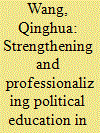

|
|
|
|
|
| Publication |
2013.
|
| Summary/Abstract |
Party control over higher education in reform-era China has been a relatively neglected topic in the extant literature. Seeking to remedy this neglect, this article focuses on an aspect of the topic that has remained unstudied in Western scholarship: namely, the post-1989 regime's efforts to strengthen and professionalize political education (PE) in universities by intensifying the 'disciplinary construction' of PE. The article finds that these efforts have been partially successful in meeting the regime's objectives. The training of PE teachers has been considerably professionalized; PE courses have become more attractive and effective; and more students tend to accept the Party-sponsored views and policies taught in PE courses, and to support Party leadership.
|
|
|
|
|
|
|
|
|
|
|
|
|
|
|
|
| 5 |
ID:
145745
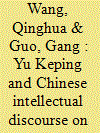

|
|
|
|
|
| Summary/Abstract |
By reviewing the ideas of Yu Keping, one of the most prominent Chinese theorists on Chinese-style democracy and a key contributor to Chinese intellectual discourse on good governance, this article has two objectives: to fill a research gap in China studies by examining influential discourse during the past decade; and to shed light on Yu's controversial conception of Chinese-style democracy, which is intertwined with his views on good governance. We find that the discourse revolves around the call to “move China towards good governance.” First, the ultimate objective of China's political reform is to move towards good governance, and not towards what Western social scientists call “democracy.” Second, “good government” and civil society are two keys for achieving good governance, which demonstrates that Yu's basic orientation is liberal. Third, governance reform, constituting a major component of China's political reform, has achieved much progress.
|
|
|
|
|
|
|
|
|
|
|
|
|
|
|
|
|
|
|
|
|